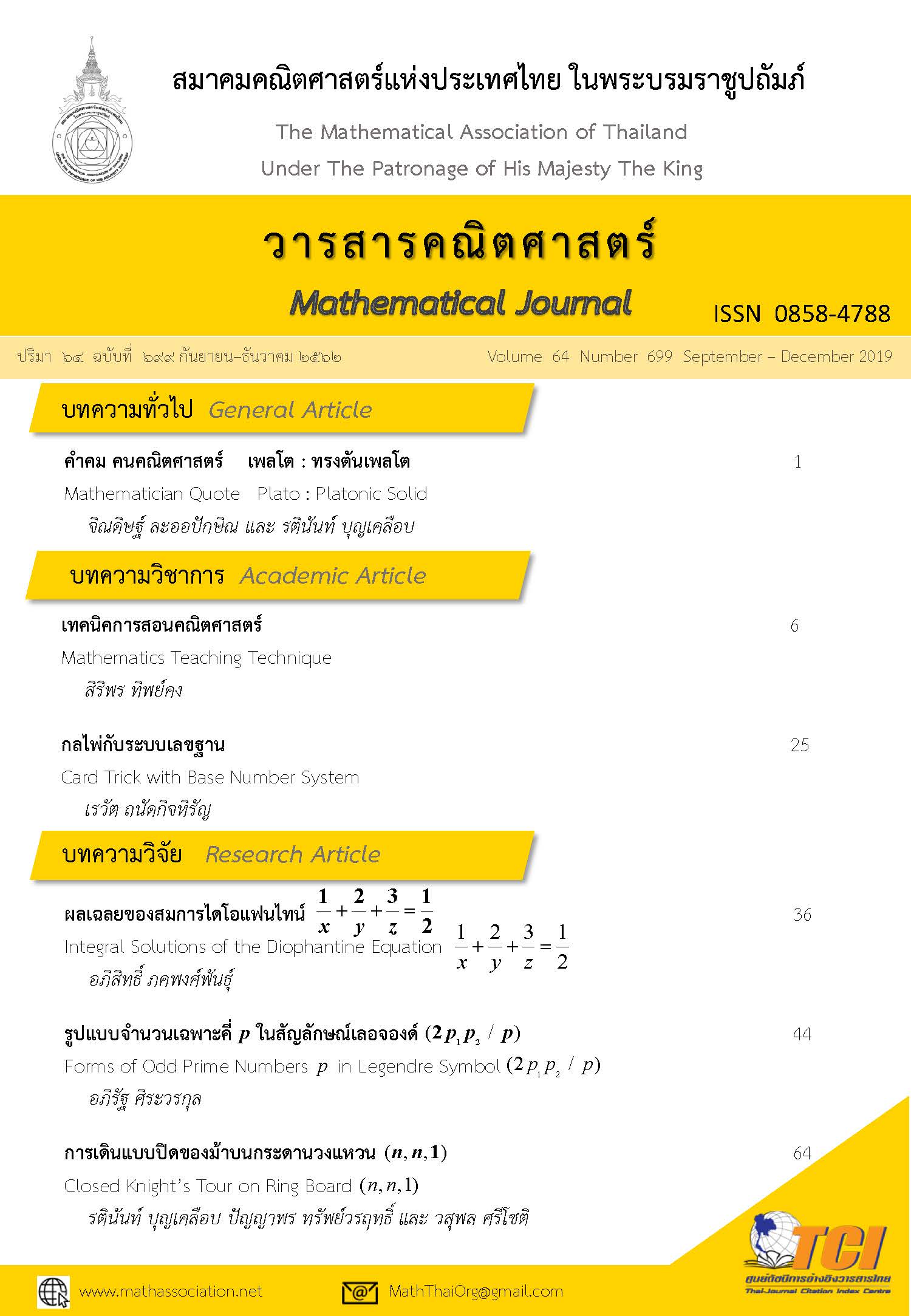Integral Solutions of the Diophantine Equation 1/x+2/y+3/z=1/2
Main Article Content
Abstract
In this paper, we find positive solutions of the Diophantine equation 1/x+2/y+3/z=1/2.
Article Details
How to Cite
Pakapongpun, A. (2019). Integral Solutions of the Diophantine Equation 1/x+2/y+3/z=1/2. Mathematical Journal by The Mathematical Association of Thailand Under The Patronage of His Majesty The King, 64(699), 36–43. Retrieved from https://ph02.tci-thaijo.org/index.php/MJMATh/article/view/184787
Section
Research Article
References
[1] Elsholtz, C. (2001). Sums of k unit fractions. Transactions of the American Mathematical society, 353(8), p. 3209 - 3227.
[2] Erdös, P. (1950). Az 1/x_1 + 1/x_2 + \cdots + 1/x_n = a/b egyenlet egesz szamu megoldasairol (On a Diophantine Equation). Mat. Lapok, 1, p. 192-210.
[3] Kotsireas, I. (1999). The Erdös-Straus conjecture on Egyptian fractions, in: Paul Erdös and his mathematics, Budapest, (János Bolyai Math. Soc., Budapest, 1999), p. 140-144.
[4] Li, D.L. (1981). Equation 4/n = 1/x + 1/y + 1/z. Journal of Number Theory. 13(4), p. 485 – 494.
[5] Rabago, J.F.T., and Tagle, R.P. (2013). On The Areas and Volume of a Certain Regular Solid and the Diophantine Equation 1/2 = 1/x + 1/y + 1/z. Note on Number Theory and Discrete Mathematics, 19(3), p. 28 - 32.
[6] Sandor, J. (2013). A Note on a Diophantine Equation. Note on Number Theory and Discrete Mathematics, 19(4), p. 1 - 3.
[7] Webb, W.A. (1970). On 4/n = 1/x + 1/y + 1/z. Proceedings of American Mathematical Society, 25(3), p. 578 - 584.
[8] Zelator, K. (2009). An Ancient Egyptian Problem: The Diophantine Equation 4/n = 1/x + 1/y + 1/z, n >= 2. arXiv:0912.2458.
[2] Erdös, P. (1950). Az 1/x_1 + 1/x_2 + \cdots + 1/x_n = a/b egyenlet egesz szamu megoldasairol (On a Diophantine Equation). Mat. Lapok, 1, p. 192-210.
[3] Kotsireas, I. (1999). The Erdös-Straus conjecture on Egyptian fractions, in: Paul Erdös and his mathematics, Budapest, (János Bolyai Math. Soc., Budapest, 1999), p. 140-144.
[4] Li, D.L. (1981). Equation 4/n = 1/x + 1/y + 1/z. Journal of Number Theory. 13(4), p. 485 – 494.
[5] Rabago, J.F.T., and Tagle, R.P. (2013). On The Areas and Volume of a Certain Regular Solid and the Diophantine Equation 1/2 = 1/x + 1/y + 1/z. Note on Number Theory and Discrete Mathematics, 19(3), p. 28 - 32.
[6] Sandor, J. (2013). A Note on a Diophantine Equation. Note on Number Theory and Discrete Mathematics, 19(4), p. 1 - 3.
[7] Webb, W.A. (1970). On 4/n = 1/x + 1/y + 1/z. Proceedings of American Mathematical Society, 25(3), p. 578 - 584.
[8] Zelator, K. (2009). An Ancient Egyptian Problem: The Diophantine Equation 4/n = 1/x + 1/y + 1/z, n >= 2. arXiv:0912.2458.

